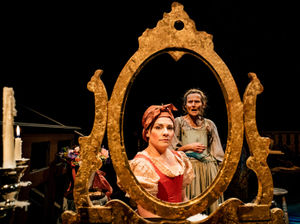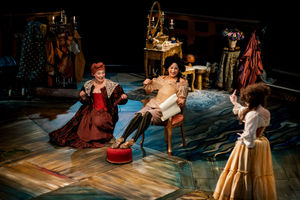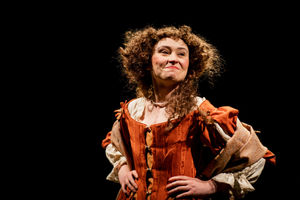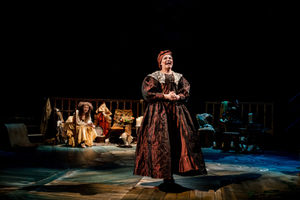Playhouse Creatures, The New Vic Theatre, Newcastle-Under-Lyme - review with pictures
“All is filth, smut, and scandalous entertainment” declaims preacher’s daughter Elizabeth Farley towards the beginning of this witty, illuminating, bawdy romp through the first years in which women were allowed to act in theatres.

April De Angelis set her 1993 play in the 1660’s, following the restoration of the monarchy, and based her five major characters on some of the first women to work professionally on English stages.
Their experience leads to dramatic transformations, none more rapid and extreme than Mrs Farley whose seduction by the glamour of the new ‘scandalous entertainment’ leads to a fleeting liaison with royalty, the predictable consequence, a horrifying attempt to deal with it, and her expulsion to a life far more filthy than the theatre.
Rebecca Marshall, who features in Pepy’s diary for both her prettiness and ‘confidence in talk’ is listened to in the salons of the day and even earns the right to own shares in the theatre company, but is forced to flee by the threat of a flogging when she falls foul of her ‘patron’.

The transformation facing Mrs Betterton is more gradual. Paid a fraction of a male actor’s fee and wanting in vain “to venture a few small opinions of my own on artistic matters”, her parts dwindle as she ages until she has two lines as ‘a belching widow’ and then is dismissed because “men want to see young women.”
A commonplace down the ages, in the hands of actor Polly Lister this becomes the most compelling theme of the piece.
Lister commands attention as the mature thespian, from her deliciously melodramatic death as Queen Cleopatra to her brilliant exposition of the horological school of acting -- “Head at twenty-to-seven for shame, five-past-twelve for despair.” Her despairing recital of Lady Macbeth sinking into insanity is both poignant and comic: “Have you gone mad?” – “No, just old and eccentric.”

Nell Gwyn, played with winning cockney wit and vivacity by Hannah Edwards, seems to be the only one to escape the indignities in store for the newly liberated ‘playhouse creatures’. “I’m just lucky. I imagine what I want and I get it.”
Her philandering got her the “house with a park” which she coveted but also, not mentioned in the play, a syphilitic death in her thirties.
The final theatrical woman, Doll Common, is a survivor. And not much more.

This is Zoȅ Waterman’s first production as Associate Director at The New Vic and it’s a very promising start. She smoothly welds together the numerous back stage stories with the onstage vignettes and lets the issues raised speak for themselves.
I loved the incidental use of Shakespeare’s song from As You Like It – Sweet Lovers Love the Spring.
Not so the high-pitched discordant electronic squeals which accompanied the prologue and epilogue. No doubt intended to unsettle, they succeeded with me to the extent that I had to cover my ears and missed some of the words.
By John Hargreaves





